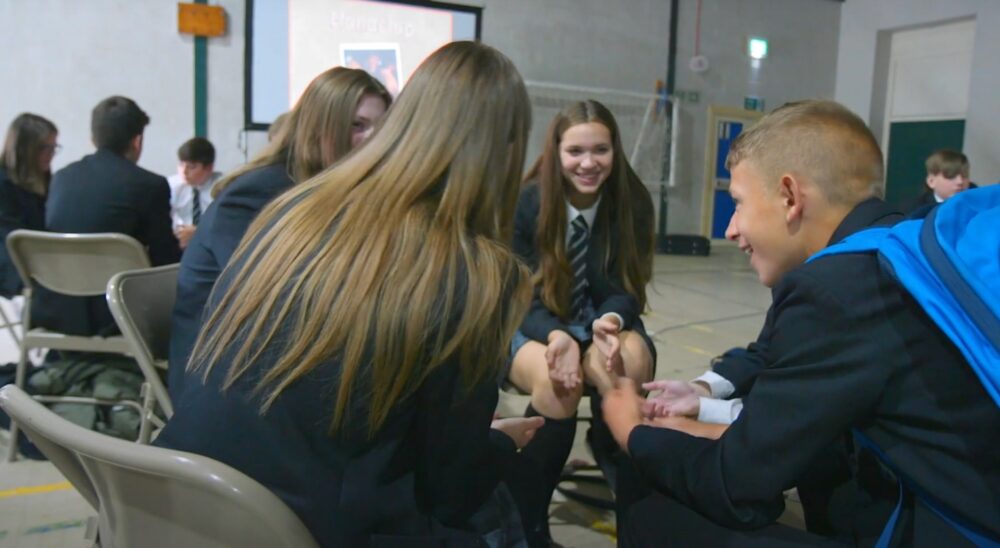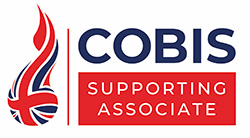“Seeing is believing,” a student from The Academy of St Nicholas stated when reflecting on their transformative experience with our Heroes Peer Mentoring Programme. In this collaborative effort, students empower and uplift their peers, fostering a sense of “better together.”
Peer mentoring programmes like the humanutopia Heroes initiative are gaining traction in schools for a reason. They offer a unique approach to fostering personal growth and academic success, capitalising on the power of shared experiences and relatable role models. As we look back over our 20 years of humanutopia, it’s important to acknowledge the enduring impact of initiatives like the Heroes programmes, which exemplify the potential of peer mentoring to create positive change.
Building Confidence and Self-Esteem:
One of the most significant effects of peer mentoring is the dramatic improvement in self-esteem observed in both mentors and mentees. The Heroes programme beautifully exemplifies this. At The Academy of St Nicholas, Year 11 students, acting as mentors, gained a sense of purpose and leadership. They developed valuable communication and presentation skills by planning and delivering “Icon Sessions” – tackling relevant topics like body image, bullying, and career aspirations. As one student with ASD said, “Becoming a hero… has given me the confidence to face the world beyond school.”
This newfound confidence translates to mentees as well. Having someone relatable to look up to and confide in can create a safe space for younger students to navigate challenges, build resilience, and develop a more positive self-image.
Fostering Hope and Happiness:
Beyond confidence, a successful peer mentoring programme can significantly impact a student’s overall well-being. The Heroes programme, which is built on one of our key values: fostering well-rounded individuals, focuses on five key areas: hope, confidence, happiness, relationships, and employability skills.
This holistic approach equips students with the tools they need to navigate the complexities of school life and fosters a sense of optimism about the future. Having a supportive peer mentor can alleviate feelings of isolation and provide a sense of belonging, leading to increased happiness and a more positive school experience.
Developing Skills for the Future:
Peer mentoring programmes like this go beyond fostering emotional well-being; they present valuable opportunities to hone essential skills for future success. Mentors like our “Heroes” develop leadership, communication, and presentation skills by planning and delivering sessions. They learn to collaborate effectively, manage their time, and adapt their communication style to suit a younger audience.
Mentees, on the other hand, benefit from exposure to role models who can share their experiences and provide guidance on navigating academic challenges and setting career goals. This exposure can spark curiosity and ignite a passion for learning, ultimately empowering young people to reach their full potential.
Building Bridges and Relationships:
Peer mentoring programmes can be powerful tools for fostering positive relationships within the school community, like this conference hosted by School Improvement Liverpool, which included staff and students from feeder primary schools. This creates an opportunity for inter-school connections, allowing mentors to gain experience outside their comfort zone and primary school students to interact with positive role models from a slightly older age group. This fosters a sense of community and belonging across the educational spectrum, echoing another core value of ours; collaboration.
The Key Ingredients for Success:
For a peer mentoring programme to thrive, there are a few key ingredients to note:
- Clear Goals and Objectives: Defining the programme goals, whether it be boosting academic achievement, enhancing social-emotional skills, or fostering school spirit, provides a roadmap for success.
- Effective Training: Mentors require training to develop essential communication, leadership, and conflict-resolution skills.
- Matching Mentors and Mentees: Careful consideration should be given to creating compatible pairings based on shared interests, learning styles, and personalities.
- Ongoing Support and Monitoring: Regular check-ins with mentors and mentees can ensure the programme remains effective and addresses any challenges that may arise.
By fostering a “better together” approach, the event at The Academy of St Nicholas demonstrates how we can empower students to support one another, develop essential life skills, and create a more positive and inclusive learning community.
As we strive to create well-rounded individuals prepared for future success, the power of peer mentoring cannot be ignored. Let’s continue to champion innovative initiatives like this as we look forward to the next 20 years of humanutopia.
















Leave a Reply